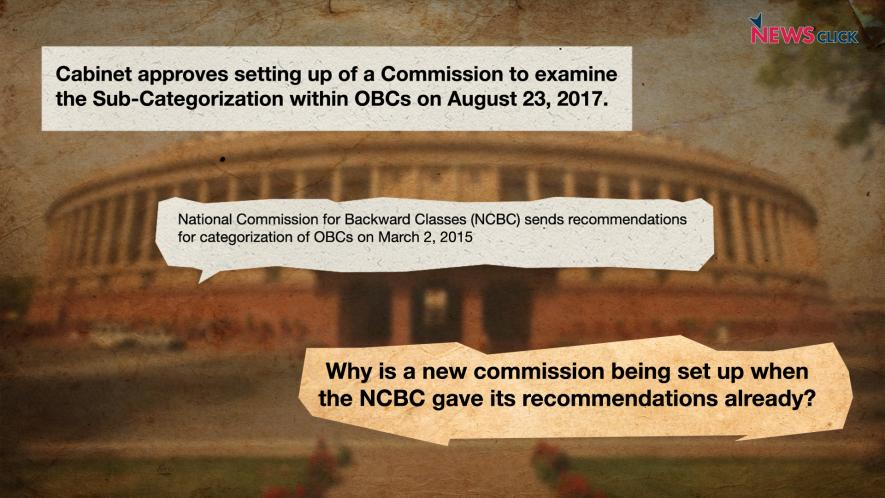A Commission for OBC Classification Already Exists, Why Set Up A New One?

The Union cabinet on August 23 approved the setting up of a commission to classify the existing category of the Other Backward Classes (OBC) into different groups for reservations at the central level. Currently, the OBCs form a single category with 27% reservation.
The Commission will have the following mandate:
i) To examine the extent of inequitable distribution of benefits of reservation among the castes/ communities included in the broad category of OBCs, with reference to the OBCs included in the Central list.
(ii) To work out the mechanism, criteria, norms and parameters, in a scientific approach, for sub-categorization within such OBCs, and,
(iii) To take up the exercise of identifying the respective castes/communities/ sub-castes/ synonyms in the Central List of OBCs and classifying them into their respective sub-categories.
The time given to the commission to give its recommendations is 12 weeks. That means, in a span of 84 days the commission has to study the status of the 2,418 communities listed in the central OBC list from all over the country.
Pramod Ranjan, editor Forward Press, a magazine that works on the issues of OBCs, welcomed the Union government’s decision to appoint a commission to look into the issue of sub-quotas within the OBCs. But Ranjan said he was sceptical about the BJP government’s intention. Pramod says, “The government should first release the data on the Caste Census that was carried out. Once the data is out, we would know which castes have benefited and which castes have not. That would create a public debate about the rationalisation of reservations for different OBC groups.”
Ranjan added, “This same party was against the recommendations of Mandal Commission being implemented and tacitly supported the Youth for Equality group, which violently protested against reservations for OBCs in Central Universities. So, its sudden love for the OBCs has to be taken with a pinch of salt.”
In fact, there is already a commission to look into the issues of the OBCs, called the National Commission for Backward Classes (NCBC). This commission was formed through an Act of Parliament in 1993. It has the mandate to recommend to the government which communities can be included into and excluded from the central OBCs list, and to generally advise the central government on the issues of the backward classes. Its recommendations are supposed to “ordinarily be binding upon the Central Government.”
The commission was approached by the Union government on February 13, 2014, through a letter (no. 1025/14/2011 - BC – 2014) undersigned by the Joint Secretary (Backward Classes), Ministry of Social Justice.
Based on the letter, the Commission held public hearings and consulted the state governments on the matter, and then gave its recommendations to the Union government on March 2, 2015.
The NCBC’s recommendations for classifying the OBCs into sub-categories were:
- Extremely Backward Classes [Group (A)] – This category includes the castes/sub-castes and groups that are extremely backward among the OBCs – like Aboriginal Tribes, Nomadic Tribes, whose traditional occupations include snake-charming, pig-rearing, bird-catching, mat-making, etc.
- More Backward Classes [Group (B)] – This category includes the castes and communities dependent on their traditional occupations, which were considered lowly – like butchery, weaving, sheep-rearing, tailoring, fishing, etc. It also suggested that Scheduled Castes who converted to Christianity be added to this category.
- Backward Classes [Group (C)] – This category includes the OBCs in the central list who own land – the cultivating castes, business and trading communities.
The Commission also recommended that an expert body like the Indian Council for Social Sciences Research (ICSSR) be appointed to develop a methodology, criteria, norms, etc. for classification. After that, the actual slotting was to be conducted with ICSSR carrying out the exercise in all the states and Union Territories with the OBCs in the Central List from that regions.
The report was then to be examined by a set of experts appointed by the NCBC and a final report was to be sent to the concerned ministry.
This begs the question: when the Union government already has a report on the classification of the OBCs – a report that is binding on the government – since March 2, 2015, why is the drama of OBC classification being played out now?
If BJP the government really wanted to keep a check on the relatively wealthy people availing the benefits of the OBC reservations, the government should have lowered the income criterion from the current Rs 6 lakh income ceiling. Instead, the Union cabinet increased the income ceiling to Rs 8 lakh during the same August 23 meeting.
Disclaimer: The views expressed here are the author's personal views, and do not necessarily represent the views of Newsclick.
Get the latest reports & analysis with people's perspective on Protests, movements & deep analytical videos, discussions of the current affairs in your Telegram app. Subscribe to NewsClick's Telegram channel & get Real-Time updates on stories, as they get published on our website.























